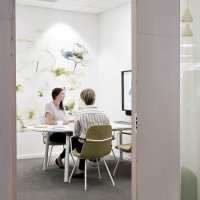To provide the best experiences, we use technologies like cookies to store and/or access device information. Consenting to these technologies will allow us to process data such as browsing behaviour or unique IDs on this site. Not consenting or withdrawing consent, may adversely affect certain features and functions.
The technical storage or access is strictly necessary for the legitimate purpose of enabling the use of a specific service explicitly requested by the subscriber or user, or for the sole purpose of carrying out the transmission of a communication over an electronic communications network.
The technical storage or access is necessary for the legitimate purpose of storing preferences that are not requested by the subscriber or user.
The technical storage or access that is used exclusively for statistical purposes.
The technical storage or access that is used exclusively for anonymous statistical purposes. Without a subpoena, voluntary compliance on the part of your Internet Service Provider, or additional records from a third party, information stored or retrieved for this purpose alone cannot usually be used to identify you.
The technical storage or access is required to create user profiles to send advertising, or to track the user on a website or across several websites for similar marketing purposes.
 Employees with full autonomy to choose where they work are happier in their job, yet only one in five are currently able to do so. And though 60 percent of all employees prefer hybrid working, only 39 percent are able to flexibly split their time between the home and office. This is according to Jabra’s 2022 edition of the Hybrid Ways of Working Global Report. Carried out amongst 2,800 knowledge workers across six countries worldwide, the report analyses employee sentiments and motivations around the physical workspace in this hybrid working era. (more…)
Employees with full autonomy to choose where they work are happier in their job, yet only one in five are currently able to do so. And though 60 percent of all employees prefer hybrid working, only 39 percent are able to flexibly split their time between the home and office. This is according to Jabra’s 2022 edition of the Hybrid Ways of Working Global Report. Carried out amongst 2,800 knowledge workers across six countries worldwide, the report analyses employee sentiments and motivations around the physical workspace in this hybrid working era. (more…)
















 After nearly two turbulent years, which for many knowledge workers have been dominated by a ground-hog day like existence, people are looking for change. This is only natural as workers around the world are re-evaluating their priorities, reigniting their passions, or simply looking for something new. This has led to a mini-exodus from businesses, which is now being dubbed the ‘
After nearly two turbulent years, which for many knowledge workers have been dominated by a ground-hog day like existence, people are looking for change. This is only natural as workers around the world are re-evaluating their priorities, reigniting their passions, or simply looking for something new. This has led to a mini-exodus from businesses, which is now being dubbed the ‘
 According to a new report findings unreliable IT service and equipment (in-office or remote) was the third most influential factor for employee turnover or burnout, behind poor salary and an unhealthy work culture. Almost 20 percent of all respondents would opt to leave their job because of a poor IT experience. The
According to a new report findings unreliable IT service and equipment (in-office or remote) was the third most influential factor for employee turnover or burnout, behind poor salary and an unhealthy work culture. Almost 20 percent of all respondents would opt to leave their job because of a poor IT experience. The 
 The
The 
 The
The 
 Employee experience has never been so high on the corporate agenda; with recent figures finding
Employee experience has never been so high on the corporate agenda; with recent figures finding 







February 14, 2022
The Great Resignation will cast a long spell
by Mark Eltringham • Comment, Flexible working, Wellbeing, Workplace design